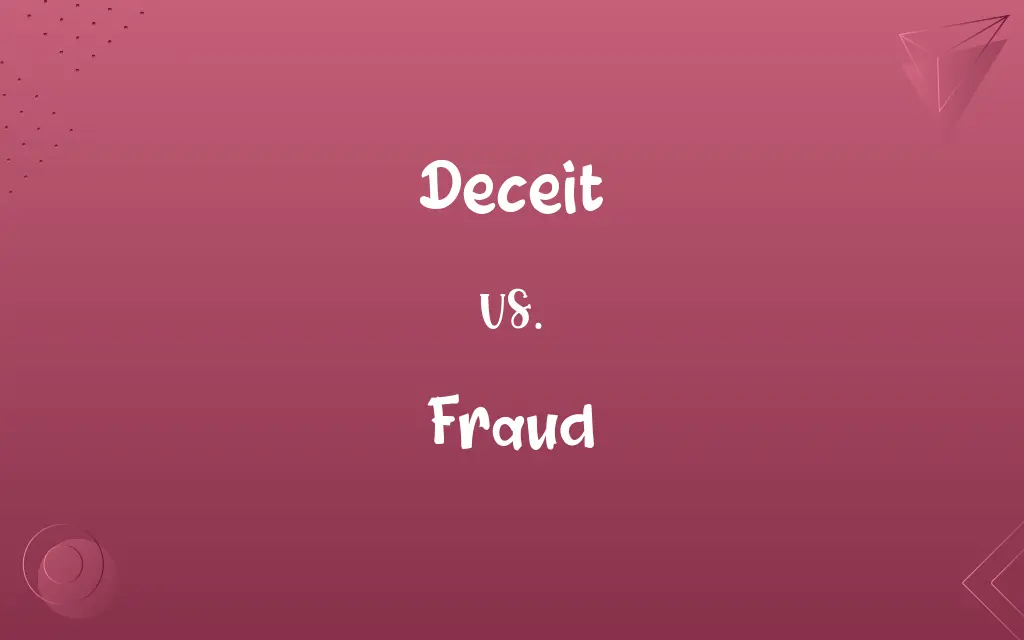Deceit vs. Fraud: Know the Difference

By Shumaila Saeed || Updated on December 25, 2023
Deceit is the act of deceiving or misleading, while fraud specifically involves deception for personal gain or to cause harm.

Key Differences
Deceit involves misleading or deceiving someone, often through false statements or actions. It is a broader concept that can encompass various forms of dishonesty. Fraud, however, is a specific type of deceit with the intent of gaining an unfair advantage, often financial or material.
Shumaila Saeed
Nov 21, 2023
Deceit can be used in a wide range of contexts, from harmless social lies to serious manipulative behaviors. It doesn't always involve material gain but can relate to misleading others for various reasons. In contrast, fraud is typically associated with illegal or unethical practices in business or personal transactions, where the deceiver benefits at the expense of another.
Shumaila Saeed
Nov 21, 2023
The concept of deceit does not necessarily imply legal repercussions; it can occur in everyday interactions without constituting a crime. Fraud, on the other hand, is often a criminal offense, as it involves using deceit to unlawfully deprive someone of their rights or property.
Shumaila Saeed
Nov 21, 2023
In literature and psychology, deceit can refer to a wide range of behaviors, from white lies to betrayal. It's more about the act of deception itself. Fraud, in legal and financial contexts, specifically refers to deceitful practices that are punishable by law, such as embezzlement or identity theft.
Shumaila Saeed
Nov 21, 2023
Deceit can occur in personal relationships, where the consequences are more emotional or relational. Fraud, however, typically has clear financial or legal implications, impacting the victim materially or legally.
Shumaila Saeed
Nov 21, 2023
ADVERTISEMENT
Comparison Chart
Definition
Act of deceiving or misleading
Deception for personal gain or harm
Shumaila Saeed
Nov 21, 2023
Contexts
Broad, varies from social to serious
Often illegal, involves financial gain
Shumaila Saeed
Nov 21, 2023
Legal Implications
Not always legally punishable
Typically involves criminal offenses
Shumaila Saeed
Nov 21, 2023
Primary Motivation
Can be varied, not just material gain
Usually for material or financial gain
Shumaila Saeed
Nov 21, 2023
ADVERTISEMENT
Deceit and Fraud Definitions
Deceit
A strategy of deception or dishonest behavior.
She used deceit to hide her real motives.
Shumaila Saeed
Nov 21, 2023
Fraud
A criminal act involving deception to gain unjust advantage.
She was found guilty of committing credit card fraud.
Shumaila Saeed
Nov 21, 2023
Deceit
Intentional concealment or misrepresentation of truth.
The scandal was rooted in layers of deceit.
Shumaila Saeed
Nov 21, 2023
Fraud
Deception for personal or financial gain.
The company was charged with fraud after falsifying reports.
Shumaila Saeed
Nov 21, 2023
Deceit
Dishonest conduct meant to manipulate or trick.
The politician's career was marred by deceit.
Shumaila Saeed
Nov 21, 2023
ADVERTISEMENT
Fraud
A person or thing intended to deceive others.
He was revealed to be a fraud when his credentials were checked.
Shumaila Saeed
Nov 21, 2023
Deceit
The quality of being deceptive or untruthful.
Deceit was a common tactic in his negotiations.
Shumaila Saeed
Nov 21, 2023
Fraud
Deliberate trickery to secure unfair or unlawful gain.
The fraud involved elaborate schemes to evade taxes.
Shumaila Saeed
Nov 21, 2023
Fraud
The use of false representation to gain an unjust advantage.
Selling fake merchandise online was part of his fraud scheme.
Shumaila Saeed
Nov 21, 2023
Fraud
A deception practiced in order to induce another to give up possession of property or surrender a right.
Shumaila Saeed
Oct 19, 2023
Deceit
An act or practice intended to deceive; a trick.
The whole conversation was merely a deceit.
Shumaila Saeed
Oct 19, 2023
Fraud
(law) The crime of stealing or otherwise illegally obtaining money by use of deception tactics.
Shumaila Saeed
Oct 19, 2023
Deceit
(law) The tort or fraudulent representation of a material fact made with knowledge of its falsity, or recklessly, or without reasonable grounds for believing its truth and with intent to induce reliance on it; the plaintiff justifiably relies on the deception, to his injury.
Shumaila Saeed
Oct 19, 2023
Fraud
Any act of deception carried out for the purpose of unfair, undeserved and/or unlawful gain.
Shumaila Saeed
Oct 19, 2023
Deceit
An attempt or disposition to deceive or lead into error; any declaration, artifice, or practice, which misleads another, or causes him to believe what is false; a contrivance to entrap; deception; a wily device; fraud.
Making the ephah small and the shekel great, and falsifying the balances by deceit.
Friendly to man, far from deceit or guile.
Yet still we hug the dear deceit.
Shumaila Saeed
Oct 19, 2023
Deceit
Any trick, collusion, contrivance, false representation, or underhand practice, used to defraud another. When injury is thereby effected, an action of deceit, as it called, lies for compensation.
Shumaila Saeed
Oct 19, 2023
Fraud
Deception deliberately practiced with a view to gaining an unlawful or unfair advantage; artifice by which the right or interest of another is injured; injurious stratagem; deceit; trick.
If success a lover's toil attends,Few ask, if fraud or force attained his ends.
Shumaila Saeed
Oct 19, 2023
Deceit
The act of misleading or deceiving someone.
His deceit involved convincing them with false promises.
Shumaila Saeed
Nov 21, 2023
Fraud
An intentional perversion of truth for the purpose of obtaining some valuable thing or promise from another.
Shumaila Saeed
Oct 19, 2023
Fraud
Something intended to deceive; deliberate trickery intended to gain an advantage
Shumaila Saeed
Oct 19, 2023
Repeatedly Asked Queries
Can Deceit be unintentional?
Deceit generally involves intentional misleading.
Shumaila Saeed
Nov 21, 2023
Are all lies considered Deceit?
Most lies can be seen as deceitful, especially if they mislead others.
Shumaila Saeed
Nov 21, 2023
How is Fraud defined?
Fraud is a deliberate deception to secure unfair or unlawful gain.
Shumaila Saeed
Nov 21, 2023
Is Fraud always illegal?
Yes, fraud is typically a criminal act involving deception for personal gain.
Shumaila Saeed
Nov 21, 2023
Does Deceit always harm others?
Often, but the impact can vary in severity.
Shumaila Saeed
Nov 21, 2023
What motivates Deceit?
Motivations range from self-protection to malicious intent.
Shumaila Saeed
Nov 21, 2023
Can Fraud occur in personal relationships?
While more common in financial contexts, fraud can occur in personal dealings.
Shumaila Saeed
Nov 21, 2023
Can Deceit be harmless?
Some deceit, like white lies, can be considered harmless.
Shumaila Saeed
Nov 21, 2023
What are legal consequences of Fraud?
Consequences include fines, restitution, and imprisonment.
Shumaila Saeed
Nov 21, 2023
Is Fraud a civil or criminal offense?
Fraud is typically a criminal offense, but can also lead to civil lawsuits.
Shumaila Saeed
Nov 21, 2023
What are common types of Fraud?
Common types include financial, insurance, and identity fraud.
Shumaila Saeed
Nov 21, 2023
Does Deceit require planning?
Some deceitful acts require planning, but others can be spontaneous.
Shumaila Saeed
Nov 21, 2023
What are common forms of Fraud?
Common forms include identity theft, credit card fraud, and insurance fraud.
Shumaila Saeed
Nov 21, 2023
How is Fraud detected?
Fraud is detected through audits, investigations, and monitoring.
Shumaila Saeed
Nov 21, 2023
How do societies view Deceit?
Most cultures view deceit negatively, associating it with dishonesty.
Shumaila Saeed
Nov 21, 2023
Share this page
Link for your blog / website
HTML
Link to share via messenger
About Author
Written by
Shumaila SaeedShumaila Saeed, an expert content creator with 6 years of experience, specializes in distilling complex topics into easily digestible comparisons, shining a light on the nuances that both inform and educate readers with clarity and accuracy.









































































